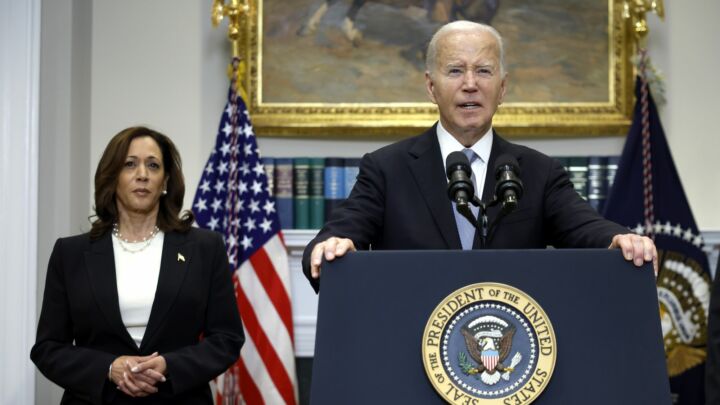How the EU brought Poland to heel
Brussels all but forced out a populist government under the guise of defending democracy.

Want to read spiked ad-free? Become a spiked supporter.
Finally, the EU is dropping its vindictive legal attack on Poland. The European Commission announced this week that it would be closing its case against Poland over alleged breaches of the rule of law.
Back in 2017, the European Commission launched Article 7 sanctions proceedings against Poland. It alleged that judicial reforms introduced by Poland’s then Law and Justice (PiS) government, which would give ministers greater oversight over the appointment of judges, were a violation of the rule of law. Poland was initially threatened with losing its voting rights in the EU. In the end, the Commission confined its attacks on the Eurosceptic, populist PiS government to financial sanctions. Over €100 billion in EU funds, mostly earmarked for Poland’s post-Covid economic recovery, were withheld. The EU hoped that by depriving Poland of these much-needed funds, it could force the Polish government to accede to its demands.
The EU has since changed its tune dramatically. This week, it said that it no longer sees a ‘clear risk of a serious breach of the rule of law’ and so it has dropped the proceedings against Poland. At first glance, this makes little sense. The only substantial change Poland has made since 2017 is to vote the PiS out of power. Since December last year, Donald Tusk, a former head of the European Council, has led the Polish government as prime minister. Tusk has proposed nine draft laws that could partially roll back the PiS’s judicial reforms, but so far nothing of legislative significance has happened.
The crowning of Tusk was apparently enough to make the EU perform a screeching u-turn on punishing Poland. Commission president Ursula von der Leyen congratulated him earlier this week on his ‘efforts’ in helping to close the Article 7 case, in what she characterised as an ‘important breakthrough’. Supposedly, a seven-year dispute over judicial reforms that were previously presented as a fundamental threat to democracy and European values has been resolved with a handshake and a few warm words. Clearly, Brussels knows that Tusk can be relied on to follow its diktats.
The Commission’s weaponisation of the law against Poland was a blatant attempt to undermine the PiS government and encourage regime change. The EU triggered Article 7 with the excuse that PiS judicial reforms would give the government too much power over the appointment of judges, thus damaging the independence of the Polish judiciary. But it was never really about that. PiS was keen to assert Poland’s national sovereignty and unapologetically rejected the woke agenda. This is what made Poland a thorn in the EU’s side.
Now that PiS is out of power and Tusk is prime minister, the Commission has little interest in punishing Poland. In fact, the Tusk government is the Commission’s new best friend. The €137 billion in EU funds that were frozen in the Article 7 dispute were released, practically overnight. Last month, Poland received the first instalment, worth €6.3 billion.
This swift unlocking of billions of euros sends a clear message to all EU member states. Any dissent from the Commission’s political agenda will incur a serious financial penalty. Meanwhile, quiet acquiescence to it will be generously rewarded. The EU is clearly more than willing to use its financial muscle to try to strong-arm uncooperative governments.
It is now undeniable that the EU’s complaints about the ‘rule of law’ were entirely cynical and hypocritical. When Poland’s new EU-approved government announced its plans to sack top court judges earlier this year, for supposedly being loyal to the right-wing opposition, there was resounding silence from Brussels. Subverting the independence of the judiciary is apparently fine, so long as it benefits the EU.
Similarly, the Commission did not object to the Tusk government’s purging of the media and other cultural institutions. One of Tusk’s first acts as prime minister was to illegally shut down the state broadcaster, TVP Media, under the guise of enforcing impartiality. In a shocking display of authoritarianism, the police were even used to physically block the sacked officials from re-entering the broadcaster’s headquarters.
Tusk has clearly been given a free pass by the Commission to bend and break the rule of law as much as he likes. So long as he does the bidding of the EU elites, Poland will likely be left in peace. The EU’s neocolonial ambitions could hardly be clearer.
Frank Furedi is the executive director of the think-tank, MCC-Brussels.
Picture by: Getty.
To enquire about republishing spiked’s content, a right to reply or to request a correction, please contact the managing editor, Viv Regan.









Comments
Want to join the conversation?
Only spiked supporters and patrons, who donate regularly to us, can comment on our articles.